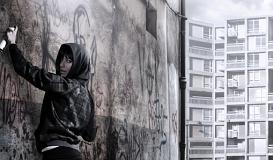Khadija is 18
Set in my home borough of Hackney in London in 2012, 'Khadija is 18' has some welcome and appealing features. First, it is about young people - and there should be more new plays which focus on the young and the problems they face. Second, it is a drama which examines a pressing, socially-complex, humanitarian issue which needs sympathetic handling and sensitive decision-making.
Khadija (Aysha Kala) is a little short of her 18th birthday. She is a refugee from Afghanistan but she speaks good English. Well, when I say 'good' English, there may be those who would quibble with that description. It is the kind of English which I hear spoken by young people on buses and in the streets of Hackney every day, yet still find some of it incomprehensible. Anyway, Khadija's English is certainly good enough for her to be understood by her peers and, in particular, by her boyfriend, Ade (played by Victor Alli).
Khadija's parents are both dead, and she knows no-one in Afghanistan anymore. The immigration service is considering her application for permanent residence in the UK. But Khadija is not hopeful of the outcome because the government department says they do not have her papers and, once she has turned 18, she can be returned to her country of origin. Her friend Liza (Katherine Rose Morley) is from Eastern Europe and is in more or less the same situation as Khadija, but also has to look after her baby sister who was forced onto her by her mother when she left Eastern Europe for England.
As a youth worker and lecturer in Sociology and Youth studies and having worked for a decade with young asylum seekers and vulnerable teenagers in London, playwright Shamser Sinha should know this subject as well as anyone. And that comes across very clearly in the dialogue and the situations where young people, alone in the world apart from social workers and solicitors to guide them, have to face complex legal situations whilst struggling to adapt to an adult world and deal with other pressures such as education. And in Liza's case, having to learn a difficult new language.
Space in fringe theatres is one of those issues which can present obstacles, and here the restrictions seemed to limit the actors' freedom of movement to some extent, though not severely so. I think with a slightly larger stage area, the actors would have naturally moved around rather more, and the space between them would have been further exaggerated. That is quite important because there is very little physical contact here between the characters. This is an obvious choice by director Tim Stark which emphasises the fact that Liza and Khadija are fighting battles largely on their own, and struggling to belong. Just a little more space might have helped in this respect. The characters, though, are well-defined by the uniformly excellent and well-directed cast. Aysha Kala provides a powerful lead as Khadija, though I wondered if her 'Englishness' was a stretch for the audience in terms of believability.
The professionalism in the acting and directing departments also extends to the technical elements too. Fly Davis's design is brutal and severe, aptly reflecting the situations which Liza and Khadija find themselves in. And there is highly effective and complementary lighting design from Dani Bish and sound design from Mark Dunne.
Though 'Khadija is 18' works effectively as a stage play, I think it also has considerable possibilities as a radio play, in which guise it might enjoy far wider recognition which it certainly deserves. And it a short play which might easily be adapted for that medium. My only gripe about the play is that we see little in terms of the bureaucratic process which Liza and Khadija have to confront. At the end of the play, when Khadija is being discharged from hospital, the authorities (the immigration service) are at the door, but we never see how our society deals with these young people and I am sure Mr Sinha could enlighten us in that regard. Nonetheless, this is a play which has something important to say and says it very well, even if you might not understand every single word of the dialogue.
(Peter Brown)
Originally published on
